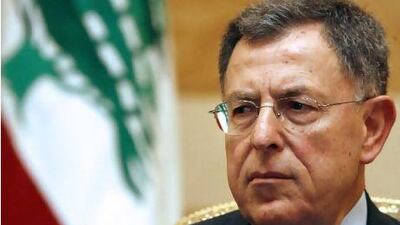I like Fouad Siniora, always have. The former Lebanese finance minister and later, more famously, prime minister, has for me always been the quintessential statesman, a technocrat with a conscience, the perfect leader for a country that in reality is more driven by the dollar than by ideology.
In February 2005, after the death of his mentor Rafik Hariri, the former prime minister, I visited Mr Siniora at the offices of the Banque de la Méditerranéein Beirut. Four months earlier, after the Syrian-backed presidential extension and Hariri's subsequent resignation, he had quit the government to become chairman of the Hariri-owned Group Méditerranée. What was arguably his finest hour was yet to come.
I was the editor of Executive magazine and scheduled to interview Mr Siniora on the state of the banking sector and the future of the economy. In true Arab fashion, the publisher suggested we go as a delegation - none of this cosy western one-on-one nonsense - so four of us were rounded up to pick his brains.
Given the recent events, Mr Siniora's mind was probably neither on the state of Lebanon's foreign currency reserves nor its debt management, and he, quite understandably on reflection, and given that we came as a group, assumed we were there to offer our condolences for his late boss. When he saw the notebooks and tape recorders, he didn't miss a beat, seamlessly switching from national tragedy to fiscal mundanity.
We did touch on the Hariri killing, to which, with suitable sorrow he said he wished, for the sake of the nation, he could swap places with the former premier. The comment later drew a few cynical giggles in the lift, but pathos aside, one could not help thinking he meant it.
Why should I like Mr Siniora? After all, there is a segment of Lebanese society that loathes the legacy of the Hariri-Siniora axis and blames our current predicament on its profligacy. His detractors accuse him, as Hariri's finance minister, of increasing Lebanon's national debt from a perfectly manageable US$2 billion (Dh7.34bn) in 1992 to more than $30bn by 2004.
There were also the charges of corruption, of which a parliamentary committee cleared him in 2003. With hindsight, the reconstruction years of the 1990s were probably unwise. But Hariri had a vision. Basically it was: 'spend and we'll get it back in spades when we make Beirut the jewel of the Levant, and the Arabs will flock to its gleaming new city centre'. It was a bold, some might even say reckless, roll of the dice, a strategy that wasn't helped by the ever-present culture of embezzlement - over which one would like to assume Mr Siniora had no control - that raised the debt. But at least there was a vision and a plan.
I like Mr Siniora simply because, as prime minister between 2005 and 2009, he represented the Lebanon many of us wanted after the Cedar Revolution. Here was a technocrat, strongly pro-business (as any good Lebanese Sunni should be) who also had a sense of duty.
He was also quite tasty in a crisis. During July and August 2006, when Lebanon was being bombed by the Israeli air force, he decried the disproportionate response to Hizbollah's catastrophic cross-border operation that sparked the war. And during the subsequent 18-month demonstration by the opposition in Hariri's downtown jewel, during which his headquarters at the Grand Serail was besieged by a mob baying for his head, he did not budge and he did not cave. In all he did, he was a statesman.
At the 2009 elections, he stepped down in favour of Hariri's son, Saad, and has since spent his time as the member of parliament for the southern city of Sidon and the head of the now-opposition parliamentary Future Bloc.
So why, many of you wonder, am I suddenly writing a paean to someone many see as yesterday's man? Well, last Friday he hit out at the US government for cutting off tens of millions of dollars in contributions to Unesco, which relies on the Americans for much of its funding, after the body granted membership to the Palestinian Territories.
Instead of urging the Arab street to rise up and take Jerusalem or burn the US and Israeli flags, Mr Siniora's reaction was to call on Arab and Islamic countries to get out their chequebooks and pay the shortfall. It would, he said "thwart Israeli blackmail and intimidation and US pressure [for the sake of] dominance". It was a suggestion on-message with the so-called Arab Awakening.
Here was a politician, a leader even, encouraging a new resistance, one that could have a more far-reaching impact than the divisive and violent ideology of his political opponents in Hizbollah. That's why I like Mr Siniora.
* Michael Karam is a freelance writer and communication consultant based in Beirut.

